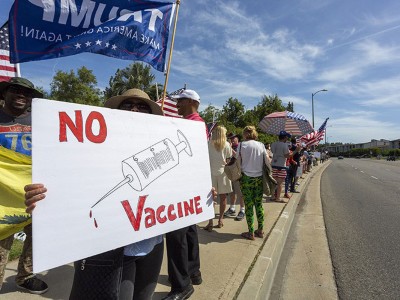The discredited doctor hailed by the anti-vaccine movement Riveting biography of Andrew Wakefield is a cautionary lesson in the legacy of hubris. Saad Omer
https://www.nature.com/articles/d41586-020-02989-9
The Doctor Who Fooled the World: Andrew Wakefield’s War on Vaccines Brian Deer Scribe UK (2020)
Since Edward Jenner’s first scientific description of vaccination in 1798 — using cowpox pus to protect against smallpox — there has been push back. Throughout the nineteenth century, in the United States and the United Kingdom, there were cycles of increased smallpox vaccination, rising opposition, drops in immunization coverage, outbreaks, better appreciation of vaccination, more of it, and more protests. This stand-off eased around the start of the twentieth century when, with sanitation and medical care improving, public health placed less emphasis on compulsory vaccination. Probably the last time the world waited with bated breath for a vaccine — against polio in the 1950s — it was welcomed with open arms.
The modern wave of vaccine scepticism has its origins in the 1970s. That was when concerns (later determined to be unfounded) about the safety of a whole-cell vaccine against pertussis, or whooping cough, came to the fore in many high-income countries. In the 1980s and 1990s, a few organized groups opposed to vaccines emerged in many countries, including the United Kingdom.
It was in this context that, in 1998, Andrew Wakefield and his colleagues published a now-infamous and retracted paper in The Lancet, following which, in 2010, Wakefield was struck off the UK medical register for misconduct by the country’s General Medical Council. The fraudulent work on 12 children promoted a non-existent connection between autism and the MMR vaccine, used against measles, mumps and rubella. It propelled Wakefield to notoriety and turbocharged the anti-vaccine movement. He remains a headliner on the international vaccine-sceptic circuit as diseases once vanquished return because of falling rates of immunization. Many large epidemiological studies have found no difference in risk of developmental delays between children who receive the MMR vaccine and those who don’t1.
Wakefield is the subject of The Doctor Who Fooled the World, a riveting new book by investigative journalist Brian Deer. It was Deer’s reporting in The Sunday Times and The BMJ that helped to debunk the 1998 study as fraught with ethical, financial and methodological impropriety. It was eventually found to have involved undisclosed conflicts of interest, and to have subjected minors to unwarranted procedures and mischaracterized their samples. Wakefield continues to defend his actions and conclusions.
Over nearly two decades, Deer has covered Wakefield’s demise and second act in detail. Yet there’s plenty of new material here, even for those (like me) who have been following the saga as detailed in a shelf-ful of books since, including Paul Offitt’s Autism’s False Prophets (2008) and Seth Mnookin’s The Panic Virus (2012). For example, we gain insights from interviews with Wakefield’s family and colleagues. The result is a compelling portrait of hubris and the terrible shadow it can cast. For example, MMR-vaccine coverage in the United Kingdom fell to around 80% in the mid-2000s (from the necessary 95%), leading to outbreaks.
So how and why did an English physician from a long line of medics become one of the most prominent faces of the global anti-vaccine movement? As his mother (also a doctor) tells it: “Even as a little boy he used to sew patches on his trousers, and they were always beautifully sewn on. And he always wanted to be a surgeon.” Wakefield switched to full-time research to focus on ideas such as the aetiology of Crohn’s disease.
Deer paints a picture of a privileged man with charisma and big ideas, who was a little too confident of his hypotheses — and a little too certain of his imperfect understanding of the topics he was investigating. We are reminded that the disastrous 1998 Lancet paper was preceded by several other Wakefield studies, not always methodologically strong. For example, Wakefield authored a paper in 1995, also in The Lancet, claiming that measles vaccination was associated with inflammatory bowel disease2. That paper compared disease occurrence in two unrelated cohorts — a child-health study from before measles vaccines were introduced, and a study of another group after its introduction. The cohorts were selected using dissimilar recruitment and follow-up methods, and from different populations. This apples-with-brussels-sprouts comparison was criticized at the time by scientists at the US Food and Drug Administration and at the Department of Health in England, and by others with expertise in statistics, epidemiology, virology and related disciplines3,4.
This unauthorized biography is also a story of Wakefield’s enablers. Some had understandable incentives, including parents of sick children desperate for answers. Others’ motives seem indefensible, among them anti-vaccine politicians, and (in Deer’s telling) institutional power players who should have known better.
How did Deer come to uncover one of the most significant scientific frauds of our time? He describes a lunch meeting in London in 2003 with a newly promoted editor at The Sunday Times that became the starting point of his investigation. We learn how a discrepancy between an interview with the mother of one of the children included in the 1998 study and the descriptions in the paper itself gave Deer one of the first clues that something sinister was afoot.
What follows is a roller-coaster ride. Wakefield’s findings were questioned in an interdisciplinary meeting at England’s Royal College of Surgeons in 1998, although it took a further 12 years for him to be stripped of his licence to practise. Deer has reported indefatigably throughout, including on Wakefield’s move to the United States, where he convinced an ever-expanding list of benefactors to support his various ventures. Among them was two-time Oscar winner Robert De Niro — who has spoken up for the 2016 film Vaxxed made by Wakefield and producer Del Bigtree.
The book is not without imperfections. For example, Deer notes too many times that Wakefield was a “doctor without patients” because, despite having a medical degree and surgical training, he, like many in biomedicine, became a full-time researcher — as if that in itself makes him worthy of our scepticism.
As with all good biographies, The Doctor Who Fooled the World is about more than the life it covers. Written pre-pandemic, it is a timely warning for the rest of us. It shows how self-importance can be self-destructive and harmful to others. The Herculean efforts of so many researchers during COVID-19 have been marred by a few individuals going well beyond their areas of expertise and endorsing outlandish hypotheses. As Deer writes: “Courage in science isn’t proving yourself right. It’s in your efforts to prove yourself wrong.” More than anything, we are reminded that investigative reporting is worth paying for, whether it is by subscribing to a local newspaper or through buying a book written by a journalist who asked the right questions.
Comments are closed.


